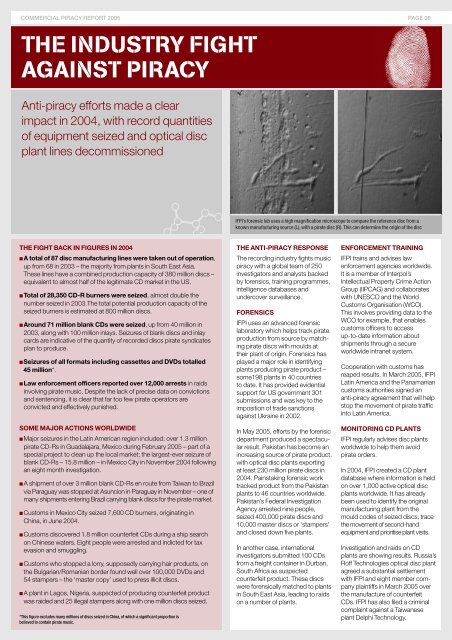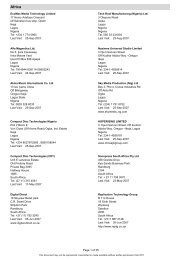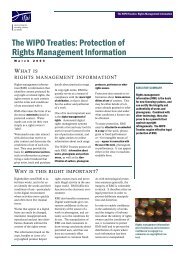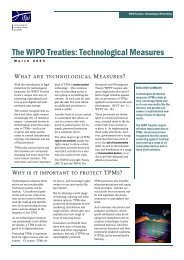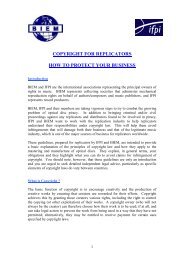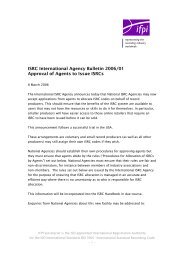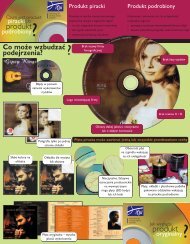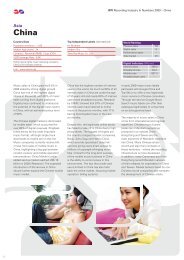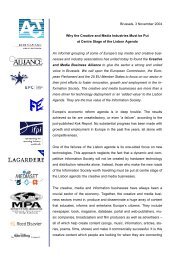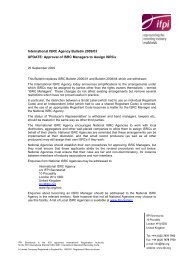*IFIC 20ppv3 - IFPI
*IFIC 20ppv3 - IFPI
*IFIC 20ppv3 - IFPI
You also want an ePaper? Increase the reach of your titles
YUMPU automatically turns print PDFs into web optimized ePapers that Google loves.
COMMERCIAL PIRACY REPORT 2005 PAGE 08<br />
THE INDUSTRY FIGHT<br />
AGAINST PIRACY<br />
Anti-piracy efforts made a clear<br />
impact in 2004, with record quantities<br />
of equipment seized and optical disc<br />
plant lines decommissioned<br />
<strong>IFPI</strong>’s forensic lab uses a high magnification microscope to compare the reference disc from a<br />
known manufacturing source (L), with a pirate disc (R). This can determine the origin of the disc<br />
THE FIGHT BACK IN FIGURES IN 2004<br />
■ A total of 87 disc manufacturing lines were taken out of operation,<br />
up from 68 in 2003 – the majority from plants in South East Asia.<br />
These lines have a combined production capacity of 380 million discs –<br />
equivalent to almost half of the legitimate CD market in the US.<br />
■ Total of 28,350 CD-R burners were seized, almost double the<br />
number seized in 2003.The total potential production capacity of the<br />
seized burners is estimated at 800 million discs.<br />
■ Around 71 million blank CDs were seized, up from 40 million in<br />
2003, along with 100 million inlays. Seizures of blank discs and inlay<br />
cards are indicative of the quantity of recorded discs pirate syndicates<br />
plan to produce.<br />
■ Seizures of all formats including cassettes and DVDs totalled<br />
45 million*.<br />
■ Law enforcement officers reported over 12,000 arrests in raids<br />
involving pirate music. Despite the lack of precise data on convictions<br />
and sentencing, it is clear that far too few pirate operators are<br />
convicted and effectively punished.<br />
SOME MAJOR ACTIONS WORLDWIDE<br />
■ Major seizures in the Latin American region included: over 1.3 million<br />
pirate CD-Rs in Guadalajara, Mexico during February 2005 – part of a<br />
special project to clean up the local market; the largest-ever seizure of<br />
blank CD-Rs – 15.8 million – in Mexico City in November 2004 following<br />
an eight month investigation.<br />
■ A shipment of over 3 million blank CD-Rs en route from Taiwan to Brazil<br />
via Paraguay was stopped at Asuncion in Paraguay in November – one of<br />
many shipments entering Brazil carrying blank discs for the pirate market.<br />
■ Customs in Mexico City seized 7,600 CD burners, originating in<br />
China, in June 2004.<br />
■ Customs discovered 1.8 million counterfeit CDs during a ship search<br />
on Chinese waters. Eight people were arrested and indicted for tax<br />
evasion and smuggling.<br />
■ Customs who stopped a lorry, supposedly carrying hair products, on<br />
the Bulgarian/Romanian border found well over 100,000 DVDs and<br />
54 stampers – the ‘master copy’ used to press illicit discs.<br />
■ A plant in Lagos, Nigeria, suspected of producing counterfeit product<br />
was raided and 25 illegal stampers along with one million discs seized.<br />
*This figure excludes many millions of discs seized in China, of which a significant proportion is<br />
believed to contain pirate music.<br />
THE ANTI-PIRACY RESPONSE<br />
The recording industry fights music<br />
piracy with a global team of 250<br />
investigators and analysts backed<br />
by forensics, training programmes,<br />
intelligence databases and<br />
undercover surveillance.<br />
FORENSICS<br />
<strong>IFPI</strong> uses an advanced forensic<br />
laboratory which helps track pirate<br />
production from source by matching<br />
pirate discs with moulds at<br />
their plant of origin. Forensics has<br />
played a major role in identifying<br />
plants producing pirate product –<br />
some198 plants in 40 countries<br />
to date. It has provided evidential<br />
support for US government 301<br />
submissions and was key to the<br />
imposition of trade sanctions<br />
against Ukraine in 2002.<br />
In May 2005, efforts by the forensic<br />
department produced a spectacular<br />
result. Pakistan has become an<br />
increasing source of pirate product,<br />
with optical disc plants exporting<br />
at least 230 million pirate discs in<br />
2004. Painstaking forensic work<br />
tracked product from the Pakistan<br />
plants to 46 countries worldwide.<br />
Pakistan’s Federal Investigation<br />
Agency arrested nine people,<br />
seized 400,000 pirate discs and<br />
10,000 master discs or ‘stampers’<br />
and closed down five plants.<br />
In another case, international<br />
investigators submitted 100 CDs<br />
from a freight container in Durban,<br />
South Africa as suspected<br />
counterfeit product. These discs<br />
were forensically matched to plants<br />
in South East Asia, leading to raids<br />
on a number of plants.<br />
ENFORCEMENT TRAINING<br />
<strong>IFPI</strong> trains and advises law<br />
enforcement agencies worldwide.<br />
It is a member of Interpol’s<br />
Intellectual Property Crime Action<br />
Group (IIPCAG) and collaborates<br />
with UNESCO and the World<br />
Customs Organisation (WCO).<br />
This involves providing data to the<br />
WCO for example, that enables<br />
customs officers to access<br />
up-to-date information about<br />
shipments through a secure<br />
worldwide intranet system.<br />
Cooperation with customs has<br />
reaped results. In March 2005, <strong>IFPI</strong><br />
Latin America and the Panamanian<br />
customs authorities signed an<br />
anti-piracy agreement that will help<br />
stop the movement of pirate traffic<br />
into Latin America.<br />
MONITORING CD PLANTS<br />
<strong>IFPI</strong> regularly advises disc plants<br />
worldwide to help them avoid<br />
pirate orders.<br />
In 2004, <strong>IFPI</strong> created a CD plant<br />
database where information is held<br />
on over 1,000 active optical disc<br />
plants worldwide. It has already<br />
been used to identify the original<br />
manufacturing plant from the<br />
mould codes of seized discs, trace<br />
the movement of second-hand<br />
equipment and prioritise plant visits.<br />
Investigation and raids on CD<br />
plants are showing results. Russia’s<br />
Roff Technologies optical disc plant<br />
agreed a substantial settlement<br />
with <strong>IFPI</strong> and eight member company<br />
plaintiffs in March 2005 over<br />
the manufacture of counterfeit<br />
CDs. <strong>IFPI</strong> has also filed a criminal<br />
complaint against a Taiwanese<br />
plant Delphi Technology.


